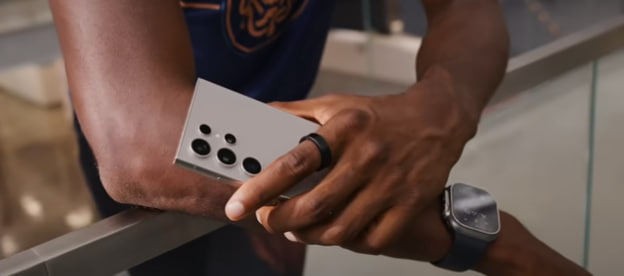In the ever-evolving world of wearables, smart rings have carved out a niche, offering a more discreet and versatile alternative to smartwatches. Samsung’s latest entrant into this space, the Samsung Galaxy Ring, aims to deliver a seamless, 24/7 wearable experience with a minimalist design. But after a week of testing, does it live up to the hype? Let’s dive into the details.
Table of Contents
1. Design and Wearability: A Ring for Every Occasion
One of the most compelling aspects of the Samsung Galaxy Ring is its sleek and versatile design. Crafted from titanium and available in three colors (gold, silver, and matte black), it’s a piece of tech that can blend into everyday life without drawing too much attention. The ring is 2.6 millimeters thick, which means it’s not the tiniest ring out there, but Samsung has managed to pack a surprising amount of technology into this small frame.

The promise of wearing the ring 24/7 is alluring—you can eat, sleep, shower, and swim with it on, thanks to its seven-day battery life. This convenience is a significant draw for those who don’t want to fuss with constant charging or removing a device before every activity. However, if you have smaller hands, the ring may look a bit bulky, and getting the right fit is crucial to ensure accurate readings. The Samsung ring sizing kit, which costs $10, helps with this.
2. Performance: Mixed Results and Inconsistent Tracking
While the Galaxy Ring’s design impresses, its performance left us with mixed feelings. The idea of an all-day activity tracker that can measure everything from calories burned to steps taken sounds fantastic, but in practice, the ring didn’t quite match up to expectations.
When compared to the Apple Watch Ultra, a significant discrepancy in activity tracking was noticed. The Galaxy Ring seemed to overcount regular activity while undercounting more specific metrics, like floors climbed. This inconsistency raises questions about its reliability as a fitness tracker. Even more concerning were the phantom heart rate readings—data continued to be recorded when the ring wasn’t being worn, which is definitely unsettling.
3. Activity Limitations: Not for Every Lifestyle
The Galaxy Ring may be designed for 24/7 wear, but it’s not suitable for every activity. The reviewer, who frequently participates in ultimate Frisbee, golf, and weight training, found the ring impractical for these sports. Since the ring had to be removed during these activities, it failed to track the very workouts that mattered most, defeating its purpose as a comprehensive fitness tracker.
While the ring did perform well during lighter workouts, like plyometrics, the auto-workout detection feature didn’t always kick in when it should have. This further added to the frustration, as the ring’s primary role as a fitness tracker became increasingly questionable.
4. Samsung Ecosystem: A Double-Edged Sword
Samsung has leaned heavily into its ecosystem with the Galaxy Ring, and this is both a strength and a limitation. The ring offers some Samsung-specific features, like the ability to dismiss alarms or take photos with a gesture when paired with a Samsung phone. However, the biggest drawback is that the Galaxy Ring only works with Samsung Galaxy phones.
This limitation is a significant disadvantage compared to competitors like the Oura Ring, which offers similar functionality but is compatible with any Android phone. If you’re not already a Samsung user, the Galaxy Ring may not be the best choice, especially when there are other smart rings on the market with broader compatibility.
5. Final Thoughts: A Great Concept, But Not for Everyone
At the end of the day, the Samsung Galaxy Ring offers an appealing concept: a minimalist, distraction-free wearable that you can forget about while it tracks your health and activity. It has some strong points, like its sleek design, long battery life, and integration into the Samsung ecosystem. However, the inconsistent performance and limitations for certain activities make it less ideal for everyone.
In summary, if you’re someone who values simplicity and already lives within the Samsung ecosystem, the Galaxy Ring might be worth considering. But if you’re looking for a more comprehensive fitness tracker or don’t own a Samsung device, you might want to explore other options.

